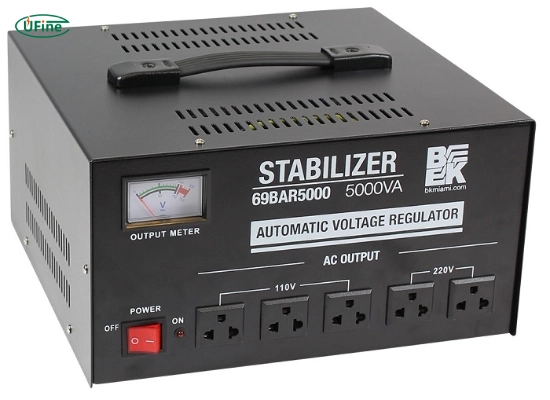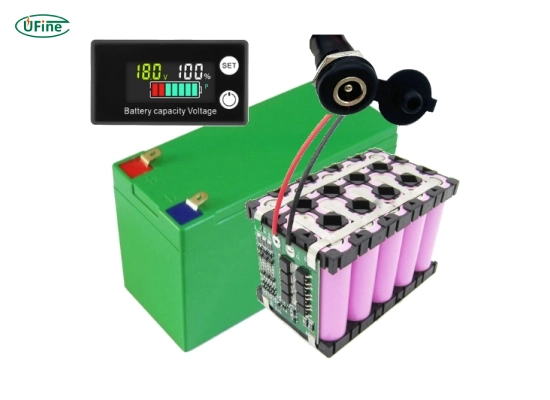Lithium-ion batteries have revolutionized the energy storage industry, powering everything from smartphones to electric vehicles (EVs). However, voltage fluctuations, common in many electrical systems, can significantly affect their performance and lifespan. That’s where voltage stabilizers come into play. These devices help regulate voltage levels, ensuring lithium-ion batteries operate efficiently and safely. But how exactly do voltage stabilizers enhance the performance of lithium-ion batteries? Let’s dive into the topic in detail.
Part 1. What is a voltage stabilizer?
A voltage stabilizer is an electrical device designed to maintain a constant voltage level regardless of fluctuations in the input voltage. It adjusts the voltage to ensure the connected devices receive a stable and consistent electricity supply. Voltage stabilizers are commonly used in households, industries, and electronic systems to protect sensitive equipment from damage caused by voltage surges or drops.
Voltage stabilizers help optimize charging and discharging cycles in lithium-ion batteries, ensuring better performance and extended battery life.
Voltage Stabilizer vs. Battery Management System: Which One Is Right for Your Lithium-Ion Setup?
Part 2. Why do lithium-ion batteries need voltage stabilizers?
Lithium-ion batteries are susceptible to voltage fluctuations. They operate within a specific voltage range, and any deviation from this range can lead to:
- Overcharging or undercharging can cause thermal runaway, overheating, and potential battery damage. On the other hand, undercharging results in reduced energy capacity and efficiency.
- Decreased lifespan: Voltage instability accelerates battery degradation, shortening its lifespan.
- Safety risks: Voltage fluctuations can lead to overheating, which may result in fire hazards or explosions.
A voltage stabilizer can mitigate these risks, ensuring the battery operates within its optimal voltage range.
Part 3. How do voltage stabilizers work with lithium-ion batteries?
Voltage stabilizers automatically regulate the input voltage before it reaches the battery. Here’s how they enhance the performance of lithium-ion batteries:
- Voltage regulation: Stabilizers ensure that the voltage supplied to the battery remains within the allowable range, preventing overcharging and undercharging.
- Surge protection: They protect the battery from sudden voltage spikes, which can damage internal components.
- Consistent power supply: Stabilizers maintain a steady flow of electricity, improving the efficiency of the battery’s charging cycles.
- Reduced heat generation: By regulating voltage, stabilizers reduce excessive heat buildup, a common cause of battery degradation.
Part 4. Benefits of using voltage stabilizers for lithium-ion batteries
Using voltage stabilizers with lithium-ion batteries offers several advantages:
- Enhanced battery lifespan: Stabilizers help extend the battery’s lifespan by maintaining optimal charging conditions.
- Improved performance: A stable voltage supply ensures consistent energy output, improving overall performance.
- Increased safety: Stabilizers minimize the risks associated with voltage fluctuations, such as overheating or thermal runaway.
- Cost savings: Stabilizers help save money in the long run, as they have a longer battery life and reduced maintenance needs.
Part 5. How do voltage fluctuations affect lithium-ion batteries?
Voltage fluctuations can significantly impact the health and performance of lithium-ion batteries. Here’s what happens when voltage levels are unstable:
- Voltage surges: When the voltage exceeds the recommended limit, it can cause internal damage to the battery’s cells, reducing capacity and efficiency.
- Voltage drops: Insufficient voltage can result in incomplete charging, limiting the battery’s energy storage potential.
- Heat buildup: Fluctuations can cause uneven charging, generating excess heat and accelerating battery degradation.
- Unpredictable performance: Unstable voltage levels can lead to inconsistent energy output, affecting the performance of devices powered by the battery.
Part 6. Can voltage stabilizers prevent battery overheating?
Yes, voltage stabilizers can play a crucial role in preventing battery overheating. Overheating is often caused by:
- Overcharging: When the battery receives more voltage than it can handle.
- Rapid voltage changes: Sudden spikes or drops in voltage can create thermal stress on the battery.
Voltage stabilizers regulate the voltage supply, ensuring the battery operates within safe temperature limits. This prevents overheating and enhances the battery’s overall safety and reliability.
Part 7. Applications of voltage stabilizers with lithium-ion batteries
Voltage stabilizers are used in various applications involving lithium-ion batteries, including:
- Electric vehicles (EVs): Stabilizers ensure efficient charging in EVs, preventing voltage fluctuations from affecting battery performance.
- Solar energy systems: Solar batteries rely on stable voltage for optimal charging and discharging cycles. Stabilizers help manage the variable voltage output from solar panels.
- Consumer electronics: Devices like smartphones, laptops, and cameras benefit from regulated voltage to ensure safe and efficient battery operation.
- Industrial equipment: Stabilizers protect lithium-ion batteries used in industrial machinery from voltage instability.
Part 8. How to choose the right voltage stabilizer for lithium-ion batteries?
When selecting a voltage stabilizer for lithium-ion batteries, consider the following factors:
- Voltage range: Ensure the stabilizer supports the input voltage range of your electrical system.
- Capacity: Choose a stabilizer with sufficient capacity to handle the power requirements of your battery and connected devices.
- Response time: A fast-responding stabilizer protects batteries from sudden voltage fluctuations.
- Type of stabilizer: Automatic voltage regulators (AVRs) are ideal for lithium-ion batteries due to their precision and reliability.
Part 9. Are voltage stabilizers cost-effective?
Yes, voltage stabilizers are a cost-effective solution for enhancing the performance and lifespan of lithium-ion batteries. While the initial investment may seem high, the long-term benefits outweigh the cost. These benefits include:
- Reduced battery replacement costs: You’ll spend less on replacements with extended battery life.
- Lower maintenance expenses: Stabilizers help prevent battery damage, reducing the need for frequent repairs.
- Improved energy efficiency: A stable voltage supply ensures efficient energy use, lowering electricity bills.
Part 10. FAQs
-
Do all lithium-ion batteries require voltage stabilizers?
Not all lithium-ion batteries require voltage stabilizers. However, they are highly recommended in systems with common voltage fluctuations, such as solar energy setups or industrial applications. -
Can a voltage stabilizer fix a damaged lithium-ion battery?
No, a voltage stabilizer cannot repair a damaged battery. Its primary function is to prevent damage by regulating voltage levels. -
How often should a voltage stabilizer be maintained?
Voltage stabilizers require minimal maintenance. Periodic inspections and cleaning are usually sufficient to ensure they operate efficiently. -
Can a voltage stabilizer improve charging speed?
While stabilizers ensure consistent charging, they do not directly increase charging speed. However, they can prevent slow charging caused by voltage drops. -
Are voltage stabilizers compatible with all types of batteries?
Voltage stabilizers are compatible with most battery types, including lithium-ion batteries. However, choosing a stabilizer that matches your battery’s specific voltage and capacity requirements is essential.
Related Tags:
More Articles

How to Choose the Best Floor Scrubber Battery for Commercial Cleaning?
Selecting the ideal floor scrubber battery ensures a long runtime, rapid charging, and minimal maintenance for efficient commercial cleaning operations.
Battery for Blower vs Battery for Leaf Vacuum: Which One Should You Choose?
Battery for blower vs leaf vacuum—learn the key differences in power, fit, and runtime to choose the right battery for your outdoor tool needs.
How to Choose the Right Battery for Blower?
Choosing the right blower battery? Consider voltage, capacity, chemistry & usage. This guide helps match the best battery for peak performance.
How to Choose the Best Insulated Battery Box for Lithium Batteries?
Choosing the Best Insulated Battery Box for Lithium Batteries? Discover key factors such as size, material, and safety for optimal protection and performance.
7 Critical Elements on a Lithium Battery Shipping Label
What must be on a lithium battery shipping label? Learn 7 key elements to ensure safety, legal compliance, and correct handling across all transport modes.





